| Listing 1 - 10 of 11 | << page >> |
Sort by
|
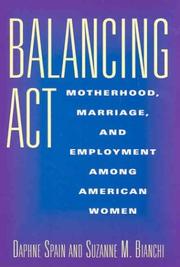
ISBN: 0871548151 Year: 1996 Publisher: New York Russell Sage Foundation
Abstract | Keywords | Export | Availability | Bookmark
 Loading...
Loading...Choose an application
- Reference Manager
- EndNote
- RefWorks (Direct export to RefWorks)
Mothers --- Women --- Work and family --- Employment --- Social conditions. --- Wages --- Income --- Physiology: reproduction & development. Ages of life --- Teaching --- Sociology of work --- Sociology of the family. Sociology of sexuality --- United States --- Social conditions --- Mothers - Employment - United States. --- United States of America --- Family --- Pay gap --- Life-forms --- Motherhood --- Labour --- Education --- Fertility --- Labour participation --- Book
Article
Abstract | Keywords | Export | Availability | Bookmark
 Loading...
Loading...Choose an application
- Reference Manager
- EndNote
- RefWorks (Direct export to RefWorks)
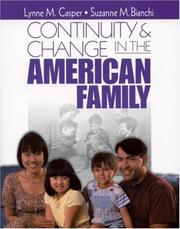
ISBN: 0761920080 1322307091 145226449X 9781452264493 9781452233871 145223387X 0761920099 9780761920090 9780761920083 9781322307091 Year: 2002 Publisher: Thousand Oaks, Calif. : Sage Publications,
Abstract | Keywords | Export | Availability | Bookmark
 Loading...
Loading...Choose an application
- Reference Manager
- EndNote
- RefWorks (Direct export to RefWorks)
This book provides a comprehensive description of the social demography of the American family. Looking at family continuity and change in the latter half of the 20th century, it explores such topics as the growth in cohabitation and changes in childbearing and how these trends affect family life. Other topics include the changing lives of single mothers, fathers, and grandparents and increasing economic disparities among families; childcare and child well being; and combining paid work and family.
Families --- Social change --- Sociology of the family. Sociology of sexuality --- United States --- United States of America
Book
ISBN: 9780877667476 Year: 2008 Publisher: Washington, D.C. Urban Institute Press
Abstract | Keywords | Export | Availability | Bookmark
 Loading...
Loading...Choose an application
- Reference Manager
- EndNote
- RefWorks (Direct export to RefWorks)
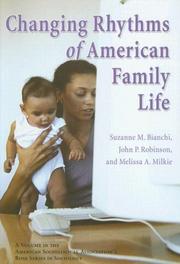
ISBN: 087154136X 9780871541369 Year: 2006 Publisher: New York, N.Y. Russell Sage Foundation
Abstract | Keywords | Export | Availability | Bookmark
 Loading...
Loading...Choose an application
- Reference Manager
- EndNote
- RefWorks (Direct export to RefWorks)
Dual-career families --- Families --- Family --- Parenting --- Time management --- -Parenting --- -Dual-career families --- -Family --- -316.356.2 <73> --- Career couples --- Couples, Dual-income --- Couples, Two-career --- Dual-career couples --- Dual-career marriage --- Dual-income couples --- Two-career couples --- Two-earner families --- Working couples --- Parent behavior --- Parental behavior in humans --- -Gezinssociologie--Verenigde Staten van Amerika. VSA. USA --- 316.356.2 <73> Gezinssociologie--Verenigde Staten van Amerika. VSA. USA --- Gezinssociologie--Verenigde Staten van Amerika. VSA. USA --- 316.356.2 <73> --- Family life --- Family relationships --- Family structure --- Relationships, Family --- Structure, Family --- Social institutions --- Birth order --- Domestic relations --- Home --- Households --- Kinship --- Marriage --- Matriarchy --- Parenthood --- Patriarchy --- Social aspects --- Social conditions --- Sociology of the family. Sociology of sexuality --- Sociology of work --- United States --- United States of America
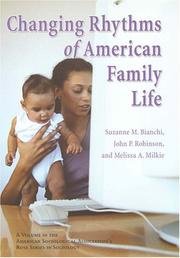
ISBN: 9780871540935 0871540932 Year: 2007 Publisher: New York: Russell Sage Foundation,
Abstract | Keywords | Export | Availability | Bookmark
 Loading...
Loading...Choose an application
- Reference Manager
- EndNote
- RefWorks (Direct export to RefWorks)
Family --- Parenting --- Dual-career families
Book
ISBN: 0871541114 0871541122 9780871541123 9780871541116 Year: 1986 Publisher: New York: Russell Sage Foundation,
Abstract | Keywords | Export | Availability | Bookmark
 Loading...
Loading...Choose an application
- Reference Manager
- EndNote
- RefWorks (Direct export to RefWorks)
Book
Year: 2006 Publisher: Cambridge, Mass. National Bureau of Economic Research
Abstract | Keywords | Export | Availability | Bookmark
 Loading...
Loading...Choose an application
- Reference Manager
- EndNote
- RefWorks (Direct export to RefWorks)
This paper examines non-response in a large government survey. The response rate for the American Time Use Survey (ATUS) has been below 60 percent for the first two years of its existence, raising questions about whether the results can be generalized to the target population. The paper begins with an analysis of the types of non-response encountered in the ATUS. We find that non-contact accounts for roughly 60 percent of ATUS non-response, with refusals accounting for roughly 40 percent. Next, we examine two hypotheses about the causes of this non-response. We find little support for the hypothesis that busy people are less likely to respond to the ATUS, but considerable support for the hypothesis that people who are weakly integrated into their communities are less likely to respond, mostly because they are less likely to be contacted. Finally, we compare aggregate estimates of time use calculated using the ATUS base weights without any adjustment for non-response to estimates calculated using the ATUS final weights with a non-response adjustment and to estimates calculated using weights that incorporate our own non-response adjustments based on a propensity model. While there are some modest differences, the three sets of estimates are broadly similar. The paper ends with a discussion of survey design features, their effect on the types and level of non-response, and the tradeoffs associated with different design choices.
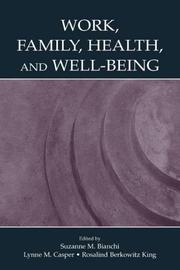
ISBN: 0805852549 0415653371 9786612326882 1282326880 1410613526 9781410613523 9780805852547 9781135605872 1135605874 9781135605827 1135605823 9781135605865 1135605866 9780415653374 Year: 2005 Publisher: Mahwah, NJ Lawrence Erlbaum
Abstract | Keywords | Export | Availability | Bookmark
 Loading...
Loading...Choose an application
- Reference Manager
- EndNote
- RefWorks (Direct export to RefWorks)
Work, Family, Health, and Well-Being grew out of a conference held in Washington, D.C. in June 2003 on ""Workforce/Workplace Mismatch: Work, Family, Health, and Well-Being"" sponsored by the National Institutes of Health (NIH). The text considers multiple dimensions of health and well-being for workers and their families, children, and communities. Investigations into the socioeconomic gradient in health within broad occupational categories have raised important questions about the role of specific working conditions versus the role of conditions of employment such as wages and level of
Families --- Family --- Health --- Sex discrimination in employment --- Social change --- Work and family --- Public health
Book

ISBN: 9780801458446 Year: 2011 Publisher: Ithaca, NY
Abstract | Keywords | Export | Availability | Bookmark
 Loading...
Loading...Choose an application
- Reference Manager
- EndNote
- RefWorks (Direct export to RefWorks)
| Listing 1 - 10 of 11 | << page >> |
Sort by
|

 Search
Search Feedback
Feedback About UniCat
About UniCat  Help
Help News
News